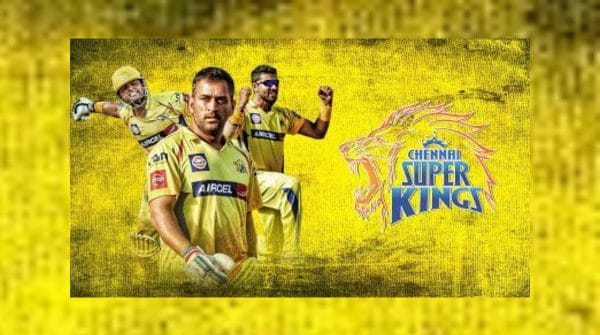
The team owner’s share price has more than doubled in the past few months and quadrupled in the past two years. It is the only sports team in the country to have its shares in the grey market
Jyotindra Dubey | New Delhi – September 14, 2020 11:54 IST
CSK shares command a price of around Rs 50-55 apiece, valuing the company at around Rs 1,800 crores.
After a long hiatus of over 6 months without any sporting activity, the IPL is expected to have a wider audience than usual owing to the pent-up demand when it kicks off on September 19th. While the on-ground performance of teams has always been closely followed, there is a growing section of people that is tracking the financial performance of stock as well.
Chennai Super Kings (CSK), the only sports team in the country to have its shares exchanging hands in the grey market, is hot property these days, witnessing a meteoric rise in its valuation.
CSK shares command a price of around Rs 50-55 apiece, valuing the company at around Rs 1,800 crores. Its share price has more than doubled from around Rs 25 a few months ago and has grown four times from its price of Rs 15 two years ago.
These are valuation jumps you’d associate with an up and coming tech start-up that defies traditional assessment metrics, not a decade old cricket team (and the only sports team in the country) to have its unlisted shares trading hands. What makes the team so attractive off the field?
What set off the interest
According to Duff & Phelps, the global valuation and corporate finance advisors, IPL’s brand value was pegged at $6.8 billion or Rs 47,500 crore at the end of its 12th season in September last year. This is more than double the $3.2 billion valuation it had at the end of its seventh season in 2014.
The eight franchisee teams also saw their brand values increasing over the years, mostly mirroring their on-field performances.
Among the most valued IPL teams are Reliance Industries-owned Mumbai Indians and India Cements- backed Chennai Super Kings, valued at Rs 809 crore and Rs 723 crore respectively. While Mumbai Indians remains wholly owned by the parent group, a series of events led CSK’s shares into the unlisted trading market, making it the first sports team in India to have its stock being bartered by traders.
CSK came into existence in 2008, when N Srinivasan-owned India Cements, the country’s leading cement manufacturer, bought the franchise rights for Rs 346 crore, to be paid in ten equal instalments over ten years until 2017-18.
It was initially run as a strategic business unit of India Cements, but was later demerged to become a wholly- owned subsidiary—Chennai Super Kings Cricket Ltd—in early 2015. In 2018, India Cements transferred the entire shareholding of CSK to a shareholders’ trust and also allotted one share of CSK for every one share of India Cement held by its retail shareholders.
Currently, India Cements shareholders trust is the largest stakeholder in CSK with 30.86 per cent stake as on 31st March 2019, according to the company’s annual report. The company doesn’t classify any shareholder as a promoter.
When CSK demerged, every shareholder in India Cements—retail shareholders, institutions, employees —became a shareholder in CSK too.
“Various mutual funds automatically got a stake in CSK in the proportion of their holding in the BSE-listed India Cements. Most of them exited CSK in the last two years. Mutual funds have an investment mandate to follow and in most of the cases they are not allowed to hold unlisted shares. Some retail investors who were not too sure about the timeline for CSK’s stock market listing in coming years too made an exit,” said Altaf Siddiqui of Enrich Advisors.
This is the event that triggered interest in the team. Suddenly, there were many shares up for grabs in an unusual segment, creating a unique opportunity to invest. No other IPL team owners have free float shares available for trading as of now.
This supply of shares was outbid by the overwhelming demand from the investor’s side, resulting in a sudden surge in the share price.
Unlocking value in a sports team
Lending trades in CSK more legitimacy was the shareholding of retail tycoon and ace investor Radhakrishan Damani, whose portfolio is widely copied, and all movements closely followed by market watchers.
Damani and his family had been piling on shares of India Cements for some months, resulting in an increase of their holdings to about 20 per cent as of March 31, 2020.
As part of the share split, Damani got around 2.39 per cent stake in CSK. He further increased his shareholding in the IPL franchise to 2.94 per cent as of March 2020.
“The presence of Damani has been one of the major reasons behind the retail investor’s interest in CSK. It gives a lot of confidence to the investors regarding the future of the company. If he manages to take control of India Cements, he will be in control of CSK too,” Siddiqui added.
Apart from Damani, the state insurer LIC also holds over 6 per cent stake. The second-largest shareholder in CSK, it contributed to propping up the trust factor among investors as well.
CSK recorded a total income of over Rs 356 crore during 2019-20, a 15 percent drop from Rs 418 crore, a year ago. Its net profit too dropped to Rs 50 crore from Rs 111 crore during the same period.
Email queries sent to CSK and Damani did not elicit any response till the time of publishing the story.
IPL Team financials for 2018-19
| TEAM | Total Income (Rs Crore) | PAT (Rs Crore) |
| Mumbai Indians | 393 | 91 |
| Kolkata Knight Riders | 448 | 133 |
| Royal Challengers Bangalore | 313 | 85 |
| Delhi Capital | 424 | 23 |
| Kings 11 Punjab | 377 | 45 |
| Rajasthan Royals | 397 | 99 |
| Chennai Super Kings | 418 | 111 |
Footnote: Seperate financials for Sunrise Hyderabad is not available.
Source: RoC
This decline in its revenues is due to the reduction of income from the grant of central rights from the BCCI, which dropped by Rs 54 crore during 2019-20. Grant of central rights includes BCCI’s earnings from IPL sponsorships, broadcasting rights, etc. BCCI keeps 50 percent of the revenue while divides the rest among eight franchises. This can be attributed to CSK’s recent drop in the ranking scheme, which reduced its share of revenue due from BCCI.
Despite the recent hiccups on the financial front, several dealers of unlisted shares believe that the CSK shares are still undervalued.
To put things in perspective, a relatively less accomplished team, Delhi Capitals, is valued at a much higher multiple than CSK. In 2018, JSW Sports acquired a 50 per cent stake in the Delhi-based IPL franchise Delhi Daredevils (later renamed as Delhi Capitals) for Rs 550 crores, valuing the franchise at around Rs 1,100 crores, which translates into an EBITDA multiple of around 35x.
By comparison, CSK is valued much lower at around 13x of its EBITDA at the current price. Since CSK is a much larger brand and is far more consistent as a team, this EBITDA multiple is much lower than what can be expected of a team of such stature. CSK is the second most successful team in IPL’s history. It has bagged three titles so far, trailing behind four-time winner Mumbai Indians.
“There will always be limited teams in IPL and thus valuation may not follow the usual revenue multiple, but it does give a sense of comparison. Also, CSK is a limited-edition stock right now, and its value will be derived mostly by its exclusivity” said an investor who recently bought into CSK.
Valuations for such companies tend to be governed by private transactions rather than business nitty-gritties. Largely considered as “trophy assets” for billionaires, the valuation of such teams is also determined by who the prospective future buyer could be, instead of being a function of the topline or bottom line. This is further accentuated by the fact that there can only be a limited number of teams and they remain largely static, even as the magnates wanting to own this asset changes.
As a consequence, a sports team reputation is very important. CSK has performed well on that account, considering its sponsorship revenue was up 24 per cent to Rs 68 crore. “Increase in sponsorship income is a very positive sign as it is directly linked to the brand image of the franchise,” said N Santosh, Director at Duff & Phelps.
The brand perception of the team is important for the stock, as these are not traditional businesses ruled by conventional business fundamentals.
CSK has been in the midst of multiple controversies. 13 staff personnel (including two players) have tested positive for coronavirus.
In another blow to the team, two of its key players, Suresh Raina and Harbhajan Singh, pulled out from the tournament and returned from the UAE citing “personal reasons”. While Raina is facing a personal tragedy, there have also been reports suggesting a rift with the management, with some suggesting that co-owner N Srinivasan indicated that Raina would soon realise his mistake and miss the money he is losing.
Srinivasan is not new to such turbulence. In 2013, Srinivasan and his son-in-law were implicated in a spot-fixing and betting scandal, which ultimately led to CSK’s temporary ban from playing in the IPL for two seasons.
A whole new ball game, but still a long shot
IPL did to cricket what La Liga and the English Premier League have accomplished in football. A seven-week affair which sees the best players almost across all cricket playing nations was the first-ever cricket league. IPL soon became iconic enough to set off many similar cricket leagues in other countries.
However, in comparison to other sports leagues globally, IPL still has a lot of ground to cover. It is just 12 years old as compared to La Liga, the Spanish football leagues which started off in 1929 or English Premier Leagues which was founded almost three decades ago.
The world’s most valuable sports franchise is the Dallas Cowboys in the NFL, American football league is currently valued at $5 billion. New York Yankees of American baseball leagues also stand at a similar valuation, according to the Forbes’ list of the most valuable sports teams-2020.
But IPL is gaining currency. Last year in September, Star Sports spent over $2.5 billion to grab five years exclusive broadcasting and digital rights for the IPL, a massive five-times increase on the annual value of the previous deal.
The new broadcasting deal translates into almost $8.5 million per game across five seasons, which is worth four times as much as an NBA game and two-thirds as much as an English Premier League game.
This also lends space to IPL franchisees to grow its influence.
For instance, Royal Challengers, the Bengaluru franchise of IPL is planning to have a junior division team under the RCB brand within the local cricket leagues, besides exploring options for branding clubs in other countries.
Kolkata Knight Riders, the Kolkata franchise in the league already owns a franchise in the Caribbean Premier League.
The much-anticipated women’s Indian Premier League (IPL) has also been approved by the IPL’s governing council earlier this month and So most likely Women’s IPL will include the same teams as in the men’s tournament, providing a strong brand extension opportunity for the existing IPL franchisees.
More teams in the ecosystem would mean more chances at a possible floating of shares. With the kind of precedent that CSK has set, every new entrant with unlisted shares is bound to be closely watched.
